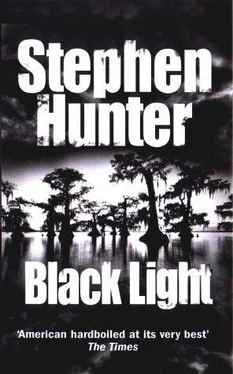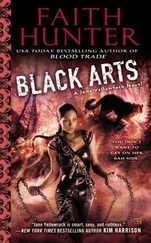Stephen Hunter - Black Light
Здесь есть возможность читать онлайн «Stephen Hunter - Black Light» весь текст электронной книги совершенно бесплатно (целиком полную версию без сокращений). В некоторых случаях можно слушать аудио, скачать через торрент в формате fb2 и присутствует краткое содержание. Год выпуска: 1996, ISBN: 1996, Издательство: Island Books, Жанр: Триллер, на английском языке. Описание произведения, (предисловие) а так же отзывы посетителей доступны на портале библиотеки ЛибКат.
- Название:Black Light
- Автор:
- Издательство:Island Books
- Жанр:
- Год:1996
- ISBN:0-385-48042-3
- Рейтинг книги:3 / 5. Голосов: 1
-
Избранное:Добавить в избранное
- Отзывы:
-
Ваша оценка:
- 60
- 1
- 2
- 3
- 4
- 5
Black Light: краткое содержание, описание и аннотация
Предлагаем к чтению аннотацию, описание, краткое содержание или предисловие (зависит от того, что написал сам автор книги «Black Light»). Если вы не нашли необходимую информацию о книге — напишите в комментариях, мы постараемся отыскать её.
Black Light — читать онлайн бесплатно полную книгу (весь текст) целиком
Ниже представлен текст книги, разбитый по страницам. Система сохранения места последней прочитанной страницы, позволяет с удобством читать онлайн бесплатно книгу «Black Light», без необходимости каждый раз заново искать на чём Вы остановились. Поставьте закладку, и сможете в любой момент перейти на страницу, на которой закончили чтение.
Интервал:
Закладка:
“Yes sir. On computers since 1993, and over in the library before then on microfilm rolls.”
“Good scout. Now, can you do me a half an hour’s worth of digging?”
“Yes sir. You know I can.”
“The kids okay, Jerry?”
“Just fine, sir.”
“Where you going on vacation this year?”
“Ah, well, sir, we’re thinking about Florida. Daytona Beach.”
“Oh, Jerry, you know I own part of the Blue Diamond Resort on Sanibel Island. Very nice place.”
“Yes sir. I could never afford Sanibel. Daytona’s it for us this year. I’ve got to pay for braces and—”
“Jerry, you want to take the wife and kids to the Blue Diamond? A mile of beach. Three heated pools. Very nice rooms.”
“Well, I—”
“Jerry. Nineteen fifty-five. July. A murder. Polk County. Shirelle Parker. Committed by a Reggie Gerard Fuller. I want to know everything about it and I want to know it fast. Got that?”
“Git right on it, sir.”
“Jerry. You know my fax number. And Jerry?”
“Yes sir?”
“Ocean side or pool side?”
“Ah—well. Ocean side. The kids love the ocean.”
“The last two weeks in August?”
“Well, that’s fine , sir.”
“You’ll get the reservations tomorrow.”
He sat back and waited. An hour passed. Then the fax machine began to hum and soon enough it had spewed out four dense hand-printed pages, a chronology of the Shirelle Parker case, running from the discovery of the body, the trial, the appeal and the execution.
He read it carefully, then a second, then a third time. The salient feature was that the body was discovered by Earl Swagger the day he died and the Times Record had a brief editorial in 1957 noting with pleasure the execution of Reggie Gerard Fuller and the closure of the heroic state policeman and Arkansas war hero’s last case.
But that wasn’t the last entry in the summary of the Times Record’s coverage. That came five years even later, with the information that a life sentence had been delivered against a white man named Jed Posey for the first-degree homicide of the father of convicted murderer Reggie Fuller, a former undertaker named Davidson Fuller, who had become stridently active in the West Arkansas Civil Rights Movement. It was the first time a white man had been convicted of first-degree murder against a Negro in the state’s history, the report said, and the prosecutor, Sam Vincent, was to be congratulated for forging ahead with the prosecution even against death threats and the sure reality that in pressing forward, Vincent was dooming his own reelection, which would cost him a job he’d held for eighteen years.
Red chewed all this over. Obviously, Sam had come to the conclusion that there was some connection between the death of Earl and the death of the girl. Had he told them? Was it their idea? What did they know in the first place?
He didn’t know. But something else he did have to know.
Jed Posey. What had happened to him?
It took a phone call to find out that after thirty-five years in prison, the old man named Jed Posey resided still on Cell Block D at the state penitentiary at Tucker.
Now, that was useful. That was very useful.
A plan began to form in his mind.
The more he thought, the more excited he got. I like it!
30
H e was a little early but it was better to be early. He’d worn better suits too, but when you buy a suit at the Fort Smith Wal-Mart at eleven o’clock to wear to an appointment at one, you can’t expect to make the pages of GQ .
Can I do this? Russ thought.
Then he thought: Yes, I can do it.
Bob dropped him at 12:55. It was a nondescript building, sheathed with new siding that cut off all windows, promising fluorescent dankness inside. It wore the odd sign DONREY HOUSEover the single grim entrance. Certainly there was no old-newspaper feeling to it, and nothing in it harkened back to glorious old days when cigar-stomping or tobacco-chewing reporters smart-assed or exaggerated their way into national reputations while having a hell of a good time.
No, the offices of Southwest Times Record , like the offices of most newspapers in America, looked as if they headquartered a smaller insurance company or a medical supply house or a catalog service.
He went into a foyer that was blankly efficient if unprepossessing and told the receptionist that he had an appointment at one o’clock with the city editor and the copy chief. He was asked to wait until a very young black woman came down and gave him a cool professional greeting and escorted him up. It was only one story and the trip took them through the newsroom—lit with bright fluorescents, as he had guessed, messy, filled with troglodytes and mutants sleeping or haphazardly cranking away at VDTs like chimps beating on toy pianos, any newsroom—and into the city editor’s office. That’s when he got his first surprise: she didn’t make the introduction because there was no one there to introduce him to. Instead, she herself slid behind the desk.
Ah! What was the name again, oh yes, Longly, Longly, Longly. Claudia Longly.
She was looking at the résumé.
“How long were you at the Oklahoman , Mr. Pewtie?”
“A year. I started on the features copy desk and they seemed to like me and I became the assistant Lifestyles editor after six months.”
“And you left …?”
“Well, I had a great idea for a book and I didn’t think I could do justice to both careers. So I left the Oklahoman two months ago to work on it exclusively; I’d saved a little money. The research got me here, and here I’ve been for three weeks now. But it’s going to take longer and I’m running out of money. So I thought if you had copy desk openings, and you were interested, I could sign on. I am good on copy. I’m fast, I don’t make mistakes, I’m pretty smart and I work hard.”
“But it’s not a career thing? You don’t see yourself committing to a career on the Record?”
“Oh, to be honest, my main thing is the book. I don’t want to lie to you. But if you offered me a position, I’d take it as a matter of course that I’d stay at least six months.”
“You went to Princeton, I see.”
“Yes. I was lucky, I got a scholarship. I was a superbrain in high school, but I got tired of the East and I felt I needed a change after two years. I did do an internship on the Miami Herald . I’ve got names and so forth for you to call if you want.”
“Can I ask what the book is about?”
“There was an act of violence in Polk County in 1955 that had a direct bearing on a subsequent act of violence in Oklahoma that affected my family. My idea was to research and dramatize both of them and show how they were connected. I’m just having trouble running down people from 1955. It’s going to take several months, not several weeks.”
“I should tell you, if you were offered a position, it’s a Guild paper. I’ll give you a copy of the contract. We’d start you at the one year’s experience mark. It would be three-fifty a week. You’d be on the morning rim, probably from four to midnight. We expect hard work, professionalism and a good attitude. I don’t like a newsroom that talks too much.”
“That’s fine,” he said.
“Well, let’s go introduce you to Bruce Sims, our copy chief. We’ll give you the test and we’ll see how you do.”
“That’s fine, thanks very much.”
Bruce Sims was a folksy older guy, about forty-five, with thinning hair and a newsroom pallor. He jawed with Russ for a bit, showed him around the newsroom, the cafeteria, the wire room, Don’s office—Don, the managing editor, would have the final say—and then finally the library.
Читать дальшеИнтервал:
Закладка:
Похожие книги на «Black Light»
Представляем Вашему вниманию похожие книги на «Black Light» списком для выбора. Мы отобрали схожую по названию и смыслу литературу в надежде предоставить читателям больше вариантов отыскать новые, интересные, ещё непрочитанные произведения.
Обсуждение, отзывы о книге «Black Light» и просто собственные мнения читателей. Оставьте ваши комментарии, напишите, что Вы думаете о произведении, его смысле или главных героях. Укажите что конкретно понравилось, а что нет, и почему Вы так считаете.












